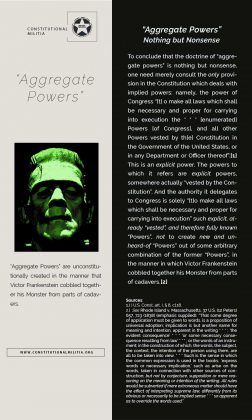Last Updated on January 16, 2023 by Constitutional Militia
“Aggregate Powers”: Powers Cobbled Together and Exercised by Rogue Government Officials That are Not Enumerated in the Constitution
Typically, when aspiring usurpers and tyrants cannot rationalize their actions by pointing to a particular power specifically enumerated in the Constitution, or some additional power which by inference can be proven to be “necessary and proper for carrying into Execution” some enumerated power,[1] they simply invent wholly imaginary powers for themselves, in the expectation that ordinary citizens either too slothful to inquire into, too stupid to discern, the deception being perpetrated upon them. Throughout American history, rogue officialdom’s primary accomplice for this chicanery has been the Judiciary—no doubt because judges have imbued themselves with an aura of impartiality and infallibility which rests upon the myth of their commitment to “due process of law”, a myth protected against easy exposure being couched in legalistic mumbo-jumbo well calculated to be largely unintelligible to the average citizen. In this regard, the United States Reports (the official record of decisions and other actions of the Supreme Court of the United States) is undoubtedly the longest work of pulp fiction ever produced in the history of mankind—replete, as it is, with politically intricate, if intellectually implausible, excuses for officials to exercise powers, not only which they do not enjoy under this country’s constitution, but also which they could not enjoy under any conceivable “Form of Government” “deriving its just powers from the consent of the governed” in conformity with “the Laws of Nature and Nature’s God”.[2]
Perhaps the most important of these imaginary sources of abusive pseudo-authority is the Judiciary’s doctrine of so–called “aggregate powers”
[I]t is not indispensable to the existence of any power claimed for the [General G]overnment that it can be found specified in the words of the Constitution, were clearly and directly traceable to some one of the specified powers. Its existence may be deduced fairly from more than one of the substantive powers expressly defined, or from all of them combined. It is allowable together any number of them and infer from them all that the power claimed has been conferred.[3]
That Congress (or any other branch of the General Government) may have exercised any extra-constitutional powers “without question” in the past would leave even the constitutionality of those purported powers still open to doubt, not irrefutable.[4] For “neither the antiquity of practice nor * * * steadfast legislative and judicial inherence to it through the centuries insulates it from constitutional attack”.[5] “[N]o one acquires a vested or protected right in violation of the Constitution by long use, even when that span of time covers our entire national existence”.[6] Not even the dubious theory that “it is emphatically the province and duty of the judicial department to say what the law is”[7] can salvage the doctrine of “aggregate powers” by an appeal to “precedents” judicial opinions— for, “[s]elf-evidently, no amount of repetition of * * * errors in judicial opinions can make the errors true”.[8]































